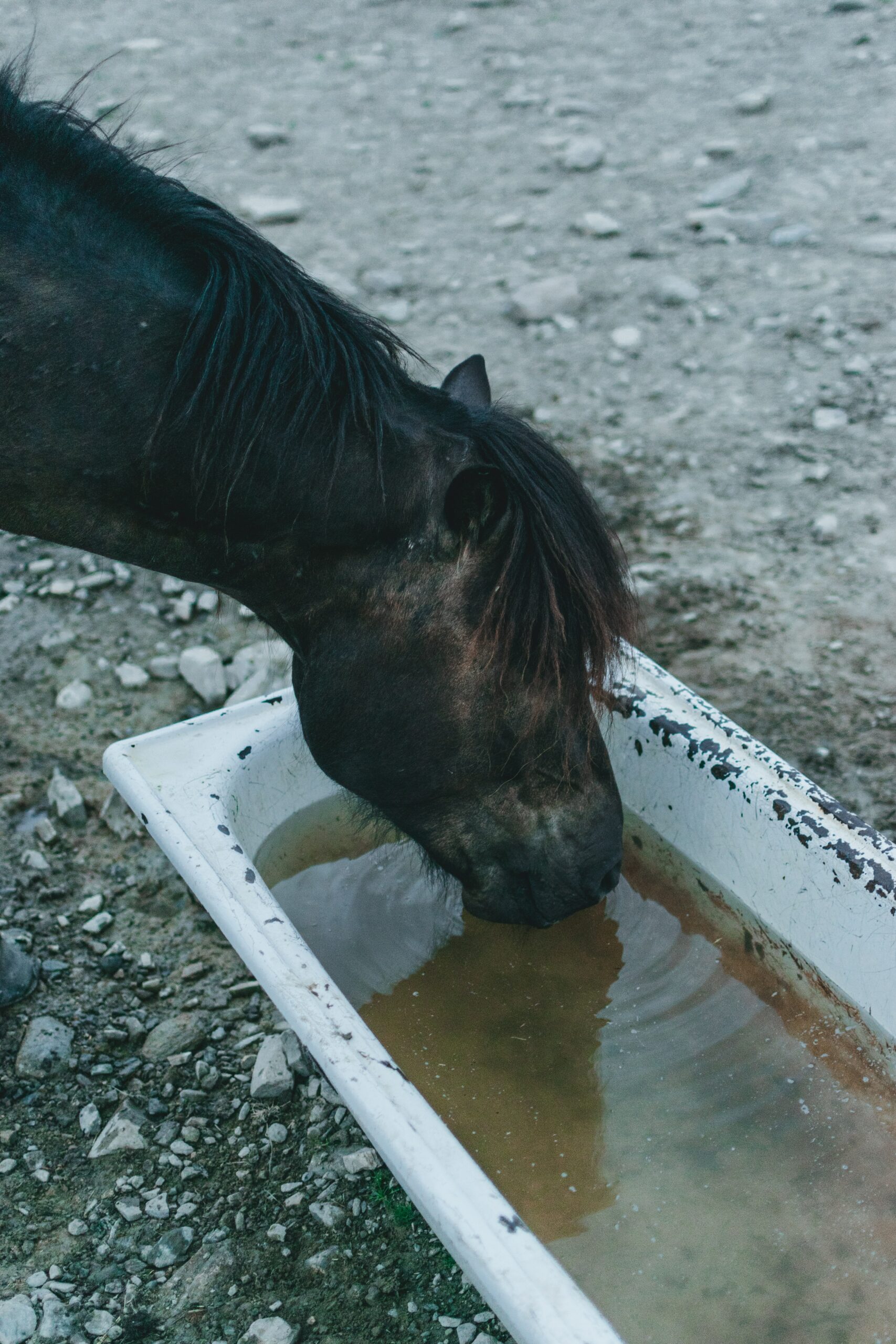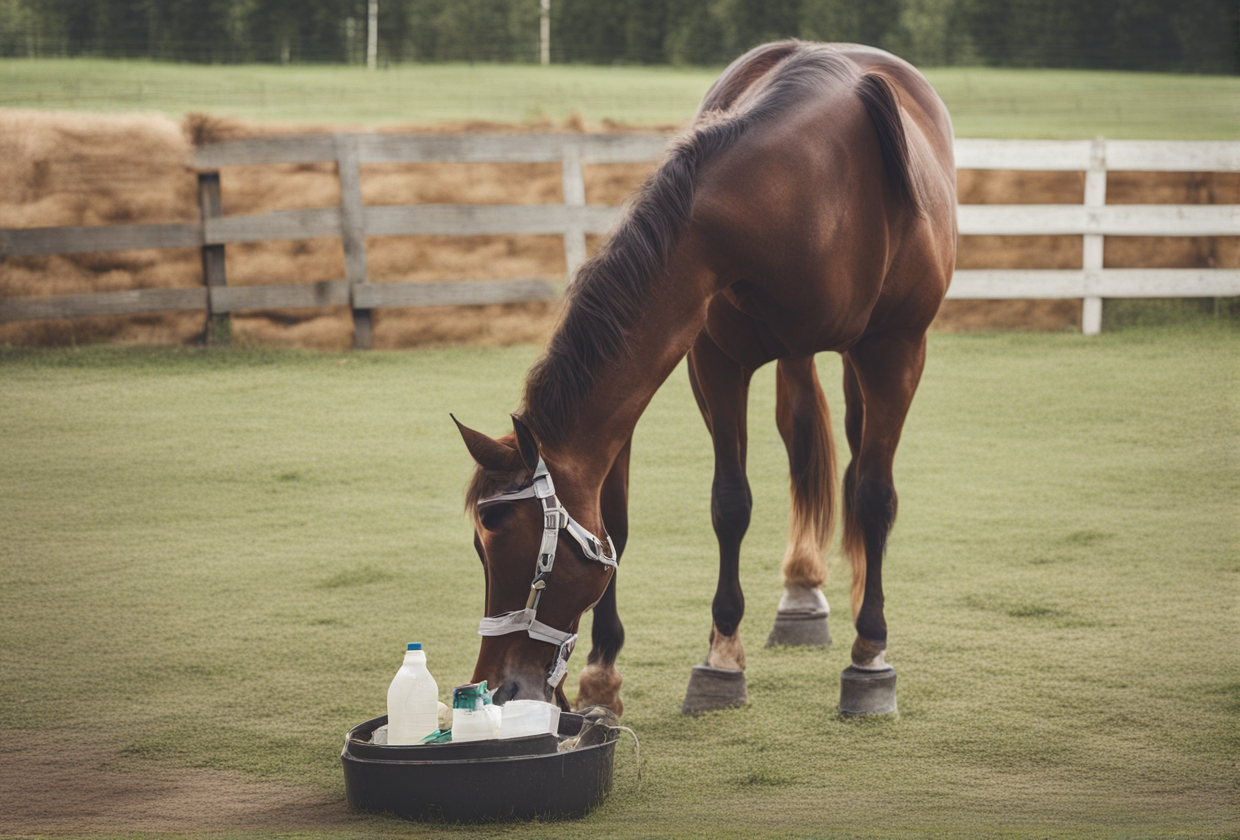As a lifelong horse gal, I’ve sure learned a ton about caring for these big ol’ animals.
A few summers back, my gelding Shadow started acting all sluggish on those scorching hot days.
After doing some digging online, I thought I’d give him an electrolyte supplement to see if it perked him up.
Well butter my biscuit, that horse was back to his frisky self in no time! Now I make sure all my horses get their electrolytes daily, especially when it’s roasting outside.
But do you really need to give yours every day? Let’s take a closer look at electrolytes and see if giving them regularly is the move for your horse.
The short answer is that most horses will benefit from getting electrolytes on a daily basis.
But some horses may only need them sometimes depending on what they’re up to, their diet, and the climate where you are.
By the end here, you’ll have a better idea if daily electrolytes make sense for Fido.
Table of Contents
What Exactly are Those Electrolyte Things?

In case you’re not up on the lingo, electrolytes are minerals in a horse’s body like sodium, potassium, calcium, and magnesium.
They help all sorts of important processes go smoothly like muscle function, signaling between nerves, keeping blood pH levels balanced, and more.
Horses can sweat out electrolytes when it’s hot out or they’re working their tail off. Just like how athletes replenish what they lose through sweating, horses need to replace lost electrolytes too, especially on steamy days or after a long ride.
Why Does Your Horse Really Need Electrolytes?

There are a few key reasons why giving your horse electrolytes is beneficial:
- To replace what sweats out during vigorous exercise, times of stress, or hot sticky weather
- To help the body absorb and hang onto water by supporting proper hydration
- To make sure normal muscle and nerve function stays steady without any mineral imbalances
- As a precaution against issues like tying up, muscle cramps, fatigue that electrolyte deficiencies can cause
Especially if your horse is working up a sweat on a daily basis, dealing with the heat, or mostly eats hay without many minerals, daily electrolytes can keep them feeling their peppy self.
When is Giving Electrolytes Daily Really Necessary?

There are some situations where giving electrolytes to your horse every single morning is usually a smart move:
- If they burn a ton of energy daily doing things like race training, three-day eventing, stadium jumping lessons – you get the picture
- If they’re in an intense conditioning program to get ready for a competition
- If you live somewhere with routine high heat and humidity that have your horse dripping wet continually
- If their diet is mostly just hay without much in the way of natural electrolyte sources
- For senior ponies or out-of-shape horses that tire easily or get muscle cramps
- Horses with existing medical conditions affecting hydration like EPM or laminitis
But for the average trail horse or pasture pet in mild climates with a varied diet, occasional electrolytes might do the trick. Still, daily is a safe way to go.
How You Can Give Electrolytes to Your Horse Every Day

Giving your horse electrolytes on a daily basis is totally simple. Here are some options for how much and how to administer it:
- Mix a scoop of electrolyte powder into their feed bucket each morning with their grain
- Give them an electrolyte paste, gel, or liquid directly in their mouth once a day
- Provide an electrolyte water source like a tub or automatic waterer they can access 24/7
- Offer electrolyte tablets or capsules according to the package directions
Most horses will happily chow down their food with electrolytes mixed in. It’s an easy peasy way to give them the minerals they require at a maintenance rate every day.
How to Choose the Right Electrolyte Supplement
There are many different electrolyte supplements on the market for horses.
You want to choose one specifically formulated for horses, not other livestock or people.
Look at the mineral and electrolyte profile listed on the ingredients.
Sodium, potassium, calcium, and magnesium should all be included.
Consider your horse’s needs based on their work, fitness level, and living conditions.
A high-powered sport supplement may be excessive for a casual riding horse.
Plain electrolyte salts lack vitamins, protein, and other supporting nutrients your horse requires.
Ask your vet or trainer for recommendations based on what’s most suitable for your horse’s needs.
Always follow dosage instructions precisely based on your horse’s weight.
Watch for signs they’re too much or too little is being given and adjust appropriately over time.
Other Benefits of Electrolytes for Horses
While replacing lost minerals is key, electrolytes provide additional advantages.
They support proper digestion and nutrient uptake in the gastrointestinal tract.
This aids overall health, coat condition, hoof quality, and energy levels.
Electrolytes can boost performance during competition or long-distance riding.
They facilitate muscle contraction and relaxation for improved stamina.
Nerve signaling runs smoothly to enhance mental focus and reaction time.
Oral electrolytes may reduce stress and fatigue after rigorous activities.
Supplementing during events or endurance rides prolongs hydration benefits.
They can strengthen hoof wall integrity and support laminitis prevention.
Overall, electrolytes optimize total body function for peak equine wellness.
Signs Your Horse May Need More Electrolytes
There are some warning flags to look out for if your horse is deficient.
Lethargy, lack of enthusiasm, and poor attitude are common signs.
Sweating more than usual after light work could mean low minerals.
Muscle cramping, tying up, or other painful muscle spasms.
Irritability, pins ears back, paces around rather than standing still.
Failure to rehydrate and retain water intake adequately.
Dark and sticky coat rather than a glossy sleek haircoat.
Thin or loose manure consistency without much firmness.
Decline in performance, stamina issues, and refusal to focus.
Digestive upset like colic could potentially result as well.
Upping their electrolytes is a simple fix for many of these issues.
Electrolyte Deficiencies to Watch Out For
A few specific electrolyte deficiency disorders can potentially develop.
Hypomagnesemia, or low magnesium, results in tetany symptoms.
These include muscle twitching, nervousness, and abnormal eye movements.
Low potassium causes periodic paralysis usually in working horses.
Calcium deficiency leads to poor appetite, lethargy, and metabolic issues.
Sodium loss causes water retention in tissues causing swelling.
Colic and tying up are serious gastrointestinal issues it can provoke.
Older horses and those in heavy work need closer electrolyte monitoring.
Replenishing levels gradually over time reverses deficiency impacts.
Catching problems early allows timely treatment for full recovery.
Prevention through daily supplementation is the easiest approach.
Electrolyte Testing Options for Horses
While obvious deficiency signs call for action, electrolyte tests confirm levels.
Blood tests check for electrolyte and mineral concentrations.
Your vet can analyze a serum sample for an accurate diagnosis.
Hair mineral analysis reveals long-term nutrient utilization.
It may detect an issue before clinical signs emerge outwardly.
Both tests provide a customized electrolyte supplementation plan.
Other options include saliva, sweat, or urine analysis as well.
Baseline testing helps customize a preventative daily dosing protocol.
Retesting periodically ensures levels stay balanced all year long.
Testing gives extra assurance your horse’s needs are fully supported.
Customizing Your Horse’s Electrolyte Plan
Not all horses have identical electrolyte requirements.
Age, breed, workload, environment are factors in individual needs.
For example, a competition endurance horse needs more than a pasture pet.
Tailor supplements based on your horse’s living conditions and diet.
Consult your vet to create an electrolyte schedule specific to your horse.
Adjust amounts and frequency based on sweat loss, performance, climate changes.
Monitor response and make notes on what dosage keeps them feeling best.
During times of increased stress or extra work, temporarily up amounts.
Learn your horse’s baseline behavior and watch for subtle changes indicating imbalance.
Adjusting quantities ensures they receive neither too much nor too little electrolytes.
Hydration and Electrolyte Connection
Proper hydration is key for overall equine health and is impacted by electrolytes.
When horses sweat heavily, electrolytes are lost along with fluids through perspiration.
Electrolytes aid fluid absorption so horses drink enough to compensate losses.
They prevent excess urination which causes greater dehydration risks.
Sodium draws water into digestive tract for efficient hydration.
Muscle contractions rely on electrolytes which prevents cramps and keeps hydration steady.
Nerve signaling requires electrolytes to coordinate thirst and fluid balance.
Dehydration occurs swiftly without replenishing electrolytes lost through sweat.
Together electrolytes and hydration maintain performance, circulation, function.
Common Myths About Electrolytes Debunked
While facts show benefits, some electrolyte claims don’t stand up.
MYTH: Electrolytes are just for hot weather – not needed year-round.
FACT: They support health always by aiding processes like digestion.
MYTH: Gatorade-type drinks are sufficient electrolyte sources for horses.
FACT: Equine-specific supplements ensure proper mineral balance.
MYTH: Only high-level performance horses require daily electrolytes.
FACT: Prevention applies to all horses facing heat, stress, or deficient diets.
MYTH: Too much can poison a horse like people.
FACT: Horses can excrete excess through manure unlike other species.
MYTH: They’re expensive to provide regularly long-term.
FACT: Daily amounts cost pennies and prevent much costlier health issues.
How Electrolytes Reduce Veterinary Expenses
While electrolyte supplements require an initial monetary commitment,
They save owners money long-term by preventing certain costly health problems.
Conditions like tying up, colic episodes, leg swelling are less likely.
Early deficiency symptoms get treated easily with balanced electrolytes.
Rather than visiting the vet, issues are avoided through daily supplementation.
Electrolytes enhance performance so horses stay sound and able to be ridden.
Fewer trips to rehabilitation from overexertion or muscle injuries result.
Electrolyte levels support total wellness so diseases are less apt to surface.
Horses in top shape require infrequent vet checkups and basic maintenance.
Your vet would agree – electrolytes are a worthwhile preventative investment.